Analysis of International Business Strategy: Tesco's Expansion
VerifiedAdded on 2023/01/12
|10
|3152
|1
Report
AI Summary
This report analyzes Tesco's international business strategy, focusing on its potential expansion into the Canadian market. It begins with an executive summary and introduction, followed by a theoretical background that includes PESTLE analysis and Dunning's electric theory to assess the external environment and the company's internationalization readiness. The report then evaluates corporate and functional strategies, discussing various market entry strategies like joint ventures and direct exporting, and recommending the most suitable approach for Tesco. It explores different internationalization paths, such as the born-global strategy, and examines corporate strategies adopted by other companies. The report concludes with recommendations for Tesco's expansion into Canada, emphasizing the importance of direct exporting and strategic planning. The report aims to provide a comprehensive understanding of the factors influencing Tesco's international business decisions and offers insights into successful market entry strategies.
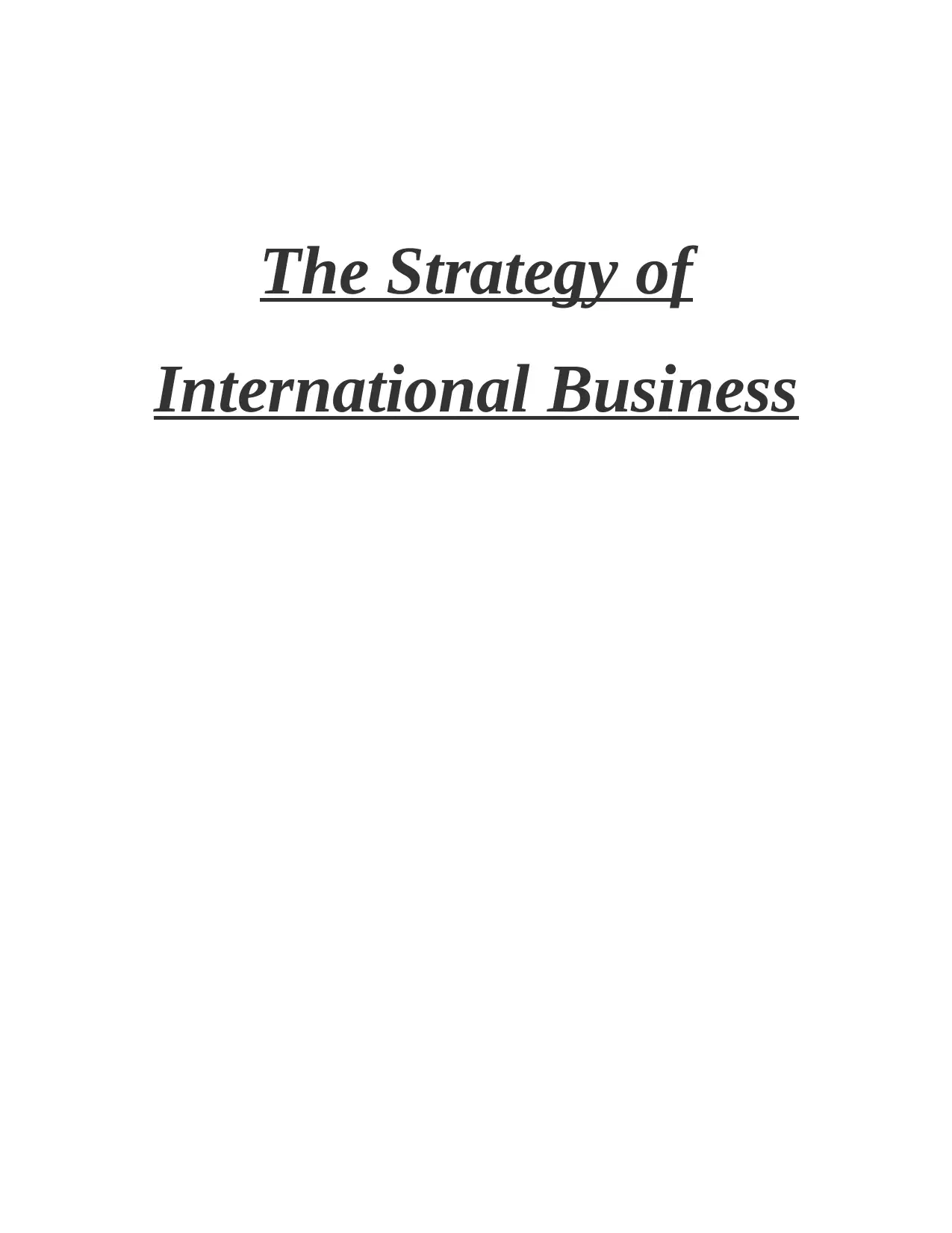
The Strategy of
International Business
International Business
Paraphrase This Document
Need a fresh take? Get an instant paraphrase of this document with our AI Paraphraser
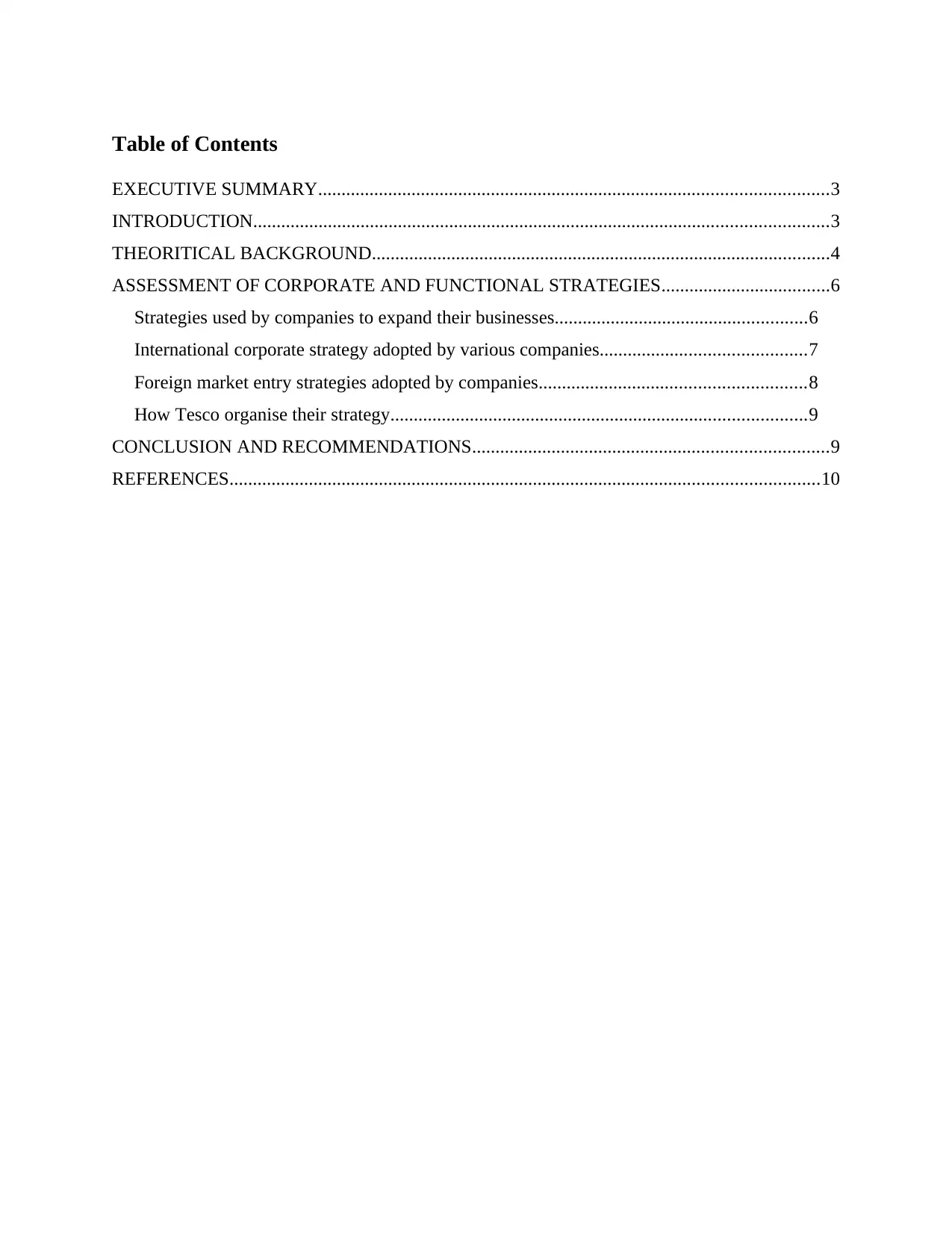
Table of Contents
EXECUTIVE SUMMARY.............................................................................................................3
INTRODUCTION...........................................................................................................................3
THEORITICAL BACKGROUND..................................................................................................4
ASSESSMENT OF CORPORATE AND FUNCTIONAL STRATEGIES....................................6
Strategies used by companies to expand their businesses......................................................6
International corporate strategy adopted by various companies............................................7
Foreign market entry strategies adopted by companies.........................................................8
How Tesco organise their strategy.........................................................................................9
CONCLUSION AND RECOMMENDATIONS............................................................................9
REFERENCES..............................................................................................................................10
EXECUTIVE SUMMARY.............................................................................................................3
INTRODUCTION...........................................................................................................................3
THEORITICAL BACKGROUND..................................................................................................4
ASSESSMENT OF CORPORATE AND FUNCTIONAL STRATEGIES....................................6
Strategies used by companies to expand their businesses......................................................6
International corporate strategy adopted by various companies............................................7
Foreign market entry strategies adopted by companies.........................................................8
How Tesco organise their strategy.........................................................................................9
CONCLUSION AND RECOMMENDATIONS............................................................................9
REFERENCES..............................................................................................................................10
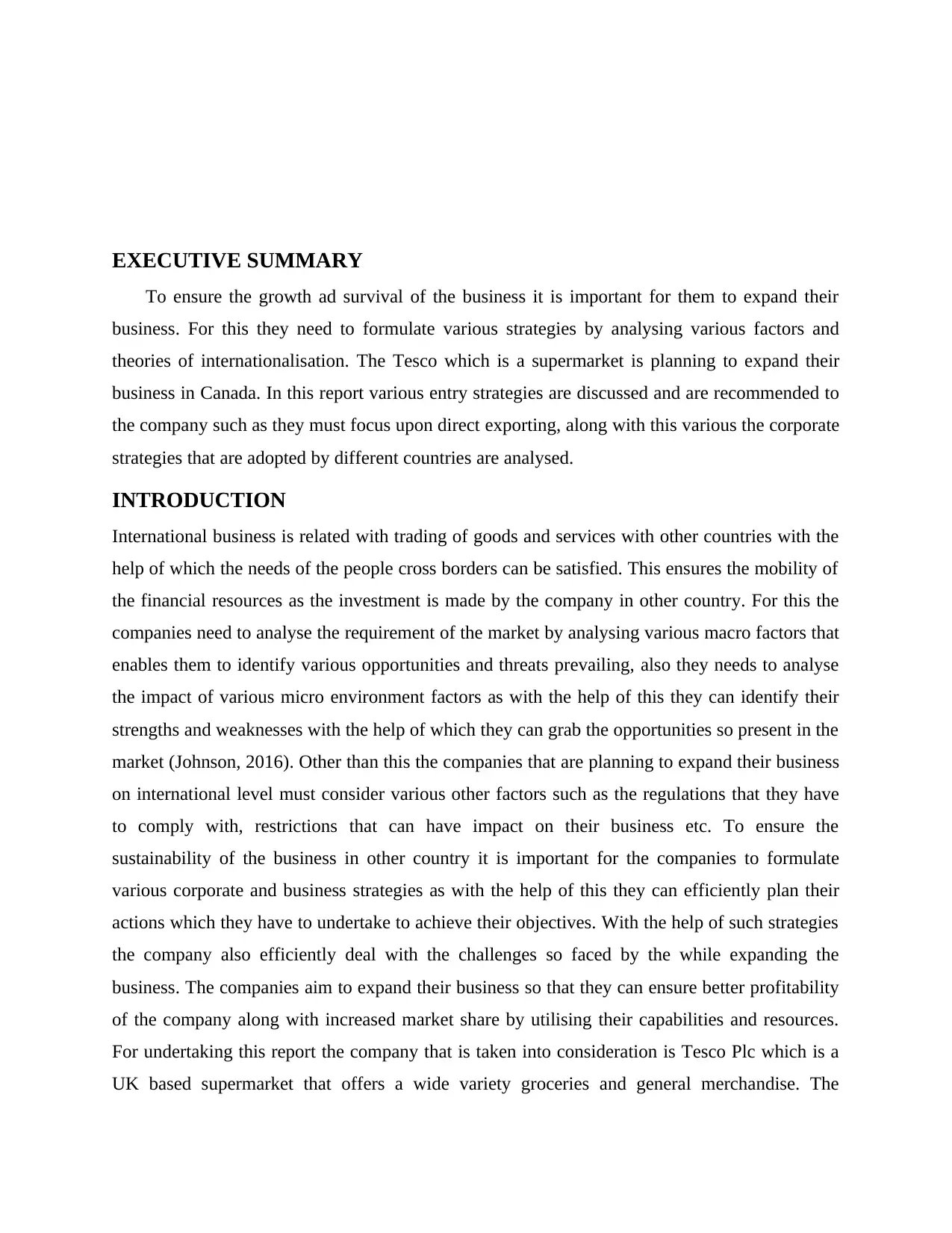
EXECUTIVE SUMMARY
To ensure the growth ad survival of the business it is important for them to expand their
business. For this they need to formulate various strategies by analysing various factors and
theories of internationalisation. The Tesco which is a supermarket is planning to expand their
business in Canada. In this report various entry strategies are discussed and are recommended to
the company such as they must focus upon direct exporting, along with this various the corporate
strategies that are adopted by different countries are analysed.
INTRODUCTION
International business is related with trading of goods and services with other countries with the
help of which the needs of the people cross borders can be satisfied. This ensures the mobility of
the financial resources as the investment is made by the company in other country. For this the
companies need to analyse the requirement of the market by analysing various macro factors that
enables them to identify various opportunities and threats prevailing, also they needs to analyse
the impact of various micro environment factors as with the help of this they can identify their
strengths and weaknesses with the help of which they can grab the opportunities so present in the
market (Johnson, 2016). Other than this the companies that are planning to expand their business
on international level must consider various other factors such as the regulations that they have
to comply with, restrictions that can have impact on their business etc. To ensure the
sustainability of the business in other country it is important for the companies to formulate
various corporate and business strategies as with the help of this they can efficiently plan their
actions which they have to undertake to achieve their objectives. With the help of such strategies
the company also efficiently deal with the challenges so faced by the while expanding the
business. The companies aim to expand their business so that they can ensure better profitability
of the company along with increased market share by utilising their capabilities and resources.
For undertaking this report the company that is taken into consideration is Tesco Plc which is a
UK based supermarket that offers a wide variety groceries and general merchandise. The
To ensure the growth ad survival of the business it is important for them to expand their
business. For this they need to formulate various strategies by analysing various factors and
theories of internationalisation. The Tesco which is a supermarket is planning to expand their
business in Canada. In this report various entry strategies are discussed and are recommended to
the company such as they must focus upon direct exporting, along with this various the corporate
strategies that are adopted by different countries are analysed.
INTRODUCTION
International business is related with trading of goods and services with other countries with the
help of which the needs of the people cross borders can be satisfied. This ensures the mobility of
the financial resources as the investment is made by the company in other country. For this the
companies need to analyse the requirement of the market by analysing various macro factors that
enables them to identify various opportunities and threats prevailing, also they needs to analyse
the impact of various micro environment factors as with the help of this they can identify their
strengths and weaknesses with the help of which they can grab the opportunities so present in the
market (Johnson, 2016). Other than this the companies that are planning to expand their business
on international level must consider various other factors such as the regulations that they have
to comply with, restrictions that can have impact on their business etc. To ensure the
sustainability of the business in other country it is important for the companies to formulate
various corporate and business strategies as with the help of this they can efficiently plan their
actions which they have to undertake to achieve their objectives. With the help of such strategies
the company also efficiently deal with the challenges so faced by the while expanding the
business. The companies aim to expand their business so that they can ensure better profitability
of the company along with increased market share by utilising their capabilities and resources.
For undertaking this report the company that is taken into consideration is Tesco Plc which is a
UK based supermarket that offers a wide variety groceries and general merchandise. The
⊘ This is a preview!⊘
Do you want full access?
Subscribe today to unlock all pages.

Trusted by 1+ million students worldwide
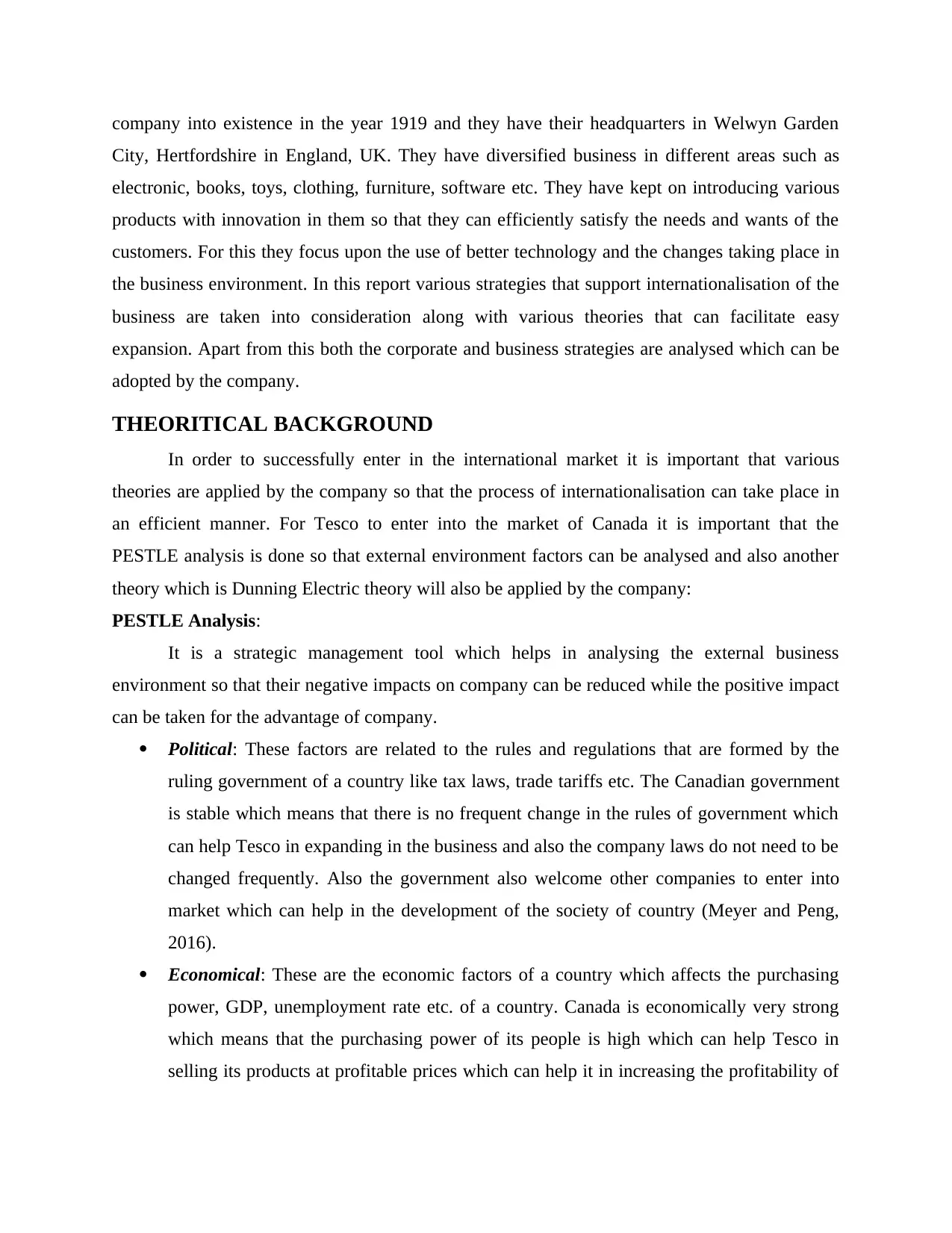
company into existence in the year 1919 and they have their headquarters in Welwyn Garden
City, Hertfordshire in England, UK. They have diversified business in different areas such as
electronic, books, toys, clothing, furniture, software etc. They have kept on introducing various
products with innovation in them so that they can efficiently satisfy the needs and wants of the
customers. For this they focus upon the use of better technology and the changes taking place in
the business environment. In this report various strategies that support internationalisation of the
business are taken into consideration along with various theories that can facilitate easy
expansion. Apart from this both the corporate and business strategies are analysed which can be
adopted by the company.
THEORITICAL BACKGROUND
In order to successfully enter in the international market it is important that various
theories are applied by the company so that the process of internationalisation can take place in
an efficient manner. For Tesco to enter into the market of Canada it is important that the
PESTLE analysis is done so that external environment factors can be analysed and also another
theory which is Dunning Electric theory will also be applied by the company:
PESTLE Analysis:
It is a strategic management tool which helps in analysing the external business
environment so that their negative impacts on company can be reduced while the positive impact
can be taken for the advantage of company.
Political: These factors are related to the rules and regulations that are formed by the
ruling government of a country like tax laws, trade tariffs etc. The Canadian government
is stable which means that there is no frequent change in the rules of government which
can help Tesco in expanding in the business and also the company laws do not need to be
changed frequently. Also the government also welcome other companies to enter into
market which can help in the development of the society of country (Meyer and Peng,
2016).
Economical: These are the economic factors of a country which affects the purchasing
power, GDP, unemployment rate etc. of a country. Canada is economically very strong
which means that the purchasing power of its people is high which can help Tesco in
selling its products at profitable prices which can help it in increasing the profitability of
City, Hertfordshire in England, UK. They have diversified business in different areas such as
electronic, books, toys, clothing, furniture, software etc. They have kept on introducing various
products with innovation in them so that they can efficiently satisfy the needs and wants of the
customers. For this they focus upon the use of better technology and the changes taking place in
the business environment. In this report various strategies that support internationalisation of the
business are taken into consideration along with various theories that can facilitate easy
expansion. Apart from this both the corporate and business strategies are analysed which can be
adopted by the company.
THEORITICAL BACKGROUND
In order to successfully enter in the international market it is important that various
theories are applied by the company so that the process of internationalisation can take place in
an efficient manner. For Tesco to enter into the market of Canada it is important that the
PESTLE analysis is done so that external environment factors can be analysed and also another
theory which is Dunning Electric theory will also be applied by the company:
PESTLE Analysis:
It is a strategic management tool which helps in analysing the external business
environment so that their negative impacts on company can be reduced while the positive impact
can be taken for the advantage of company.
Political: These factors are related to the rules and regulations that are formed by the
ruling government of a country like tax laws, trade tariffs etc. The Canadian government
is stable which means that there is no frequent change in the rules of government which
can help Tesco in expanding in the business and also the company laws do not need to be
changed frequently. Also the government also welcome other companies to enter into
market which can help in the development of the society of country (Meyer and Peng,
2016).
Economical: These are the economic factors of a country which affects the purchasing
power, GDP, unemployment rate etc. of a country. Canada is economically very strong
which means that the purchasing power of its people is high which can help Tesco in
selling its products at profitable prices which can help it in increasing the profitability of
Paraphrase This Document
Need a fresh take? Get an instant paraphrase of this document with our AI Paraphraser
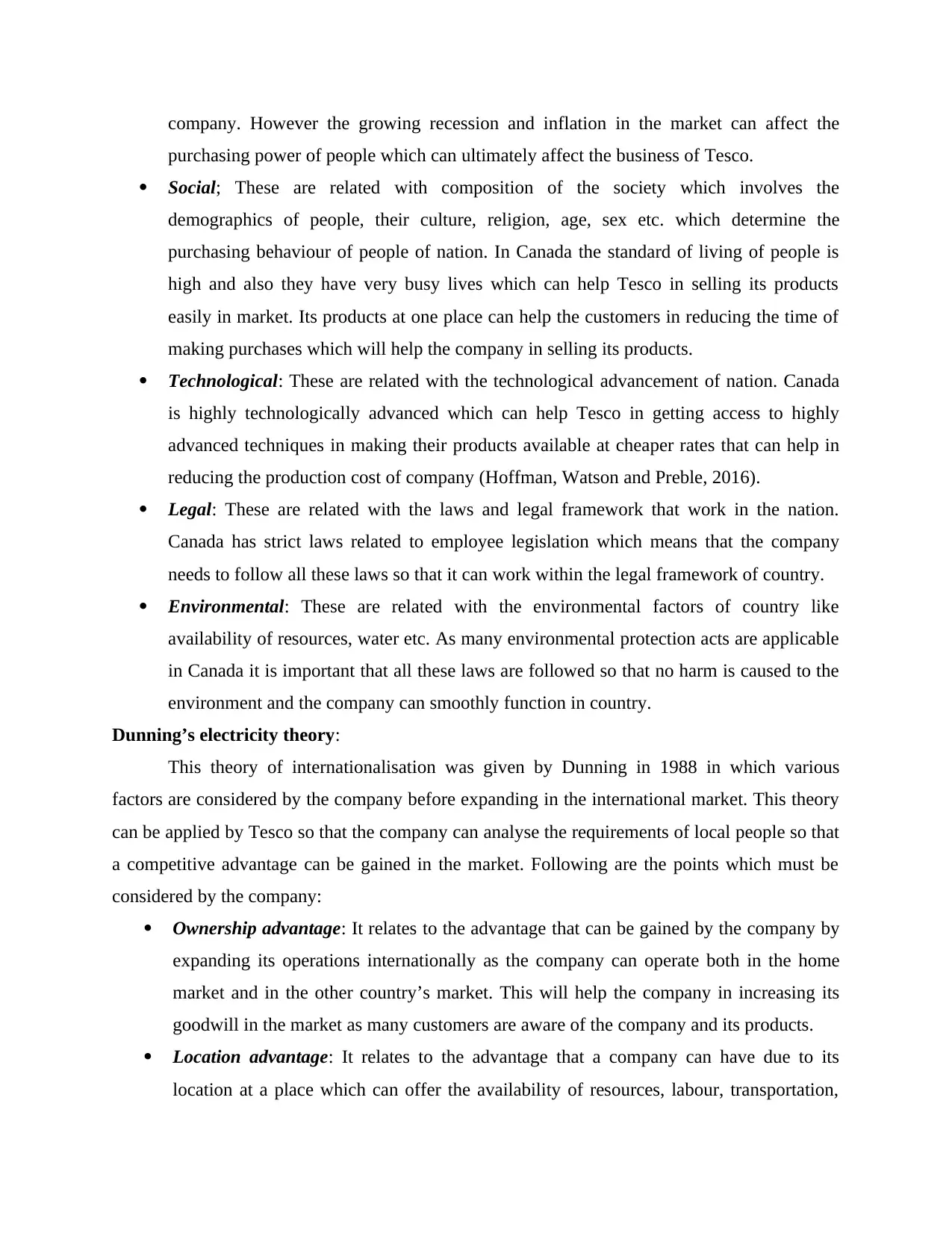
company. However the growing recession and inflation in the market can affect the
purchasing power of people which can ultimately affect the business of Tesco.
Social; These are related with composition of the society which involves the
demographics of people, their culture, religion, age, sex etc. which determine the
purchasing behaviour of people of nation. In Canada the standard of living of people is
high and also they have very busy lives which can help Tesco in selling its products
easily in market. Its products at one place can help the customers in reducing the time of
making purchases which will help the company in selling its products.
Technological: These are related with the technological advancement of nation. Canada
is highly technologically advanced which can help Tesco in getting access to highly
advanced techniques in making their products available at cheaper rates that can help in
reducing the production cost of company (Hoffman, Watson and Preble, 2016).
Legal: These are related with the laws and legal framework that work in the nation.
Canada has strict laws related to employee legislation which means that the company
needs to follow all these laws so that it can work within the legal framework of country.
Environmental: These are related with the environmental factors of country like
availability of resources, water etc. As many environmental protection acts are applicable
in Canada it is important that all these laws are followed so that no harm is caused to the
environment and the company can smoothly function in country.
Dunning’s electricity theory:
This theory of internationalisation was given by Dunning in 1988 in which various
factors are considered by the company before expanding in the international market. This theory
can be applied by Tesco so that the company can analyse the requirements of local people so that
a competitive advantage can be gained in the market. Following are the points which must be
considered by the company:
Ownership advantage: It relates to the advantage that can be gained by the company by
expanding its operations internationally as the company can operate both in the home
market and in the other country’s market. This will help the company in increasing its
goodwill in the market as many customers are aware of the company and its products.
Location advantage: It relates to the advantage that a company can have due to its
location at a place which can offer the availability of resources, labour, transportation,
purchasing power of people which can ultimately affect the business of Tesco.
Social; These are related with composition of the society which involves the
demographics of people, their culture, religion, age, sex etc. which determine the
purchasing behaviour of people of nation. In Canada the standard of living of people is
high and also they have very busy lives which can help Tesco in selling its products
easily in market. Its products at one place can help the customers in reducing the time of
making purchases which will help the company in selling its products.
Technological: These are related with the technological advancement of nation. Canada
is highly technologically advanced which can help Tesco in getting access to highly
advanced techniques in making their products available at cheaper rates that can help in
reducing the production cost of company (Hoffman, Watson and Preble, 2016).
Legal: These are related with the laws and legal framework that work in the nation.
Canada has strict laws related to employee legislation which means that the company
needs to follow all these laws so that it can work within the legal framework of country.
Environmental: These are related with the environmental factors of country like
availability of resources, water etc. As many environmental protection acts are applicable
in Canada it is important that all these laws are followed so that no harm is caused to the
environment and the company can smoothly function in country.
Dunning’s electricity theory:
This theory of internationalisation was given by Dunning in 1988 in which various
factors are considered by the company before expanding in the international market. This theory
can be applied by Tesco so that the company can analyse the requirements of local people so that
a competitive advantage can be gained in the market. Following are the points which must be
considered by the company:
Ownership advantage: It relates to the advantage that can be gained by the company by
expanding its operations internationally as the company can operate both in the home
market and in the other country’s market. This will help the company in increasing its
goodwill in the market as many customers are aware of the company and its products.
Location advantage: It relates to the advantage that a company can have due to its
location at a place which can offer the availability of resources, labour, transportation,
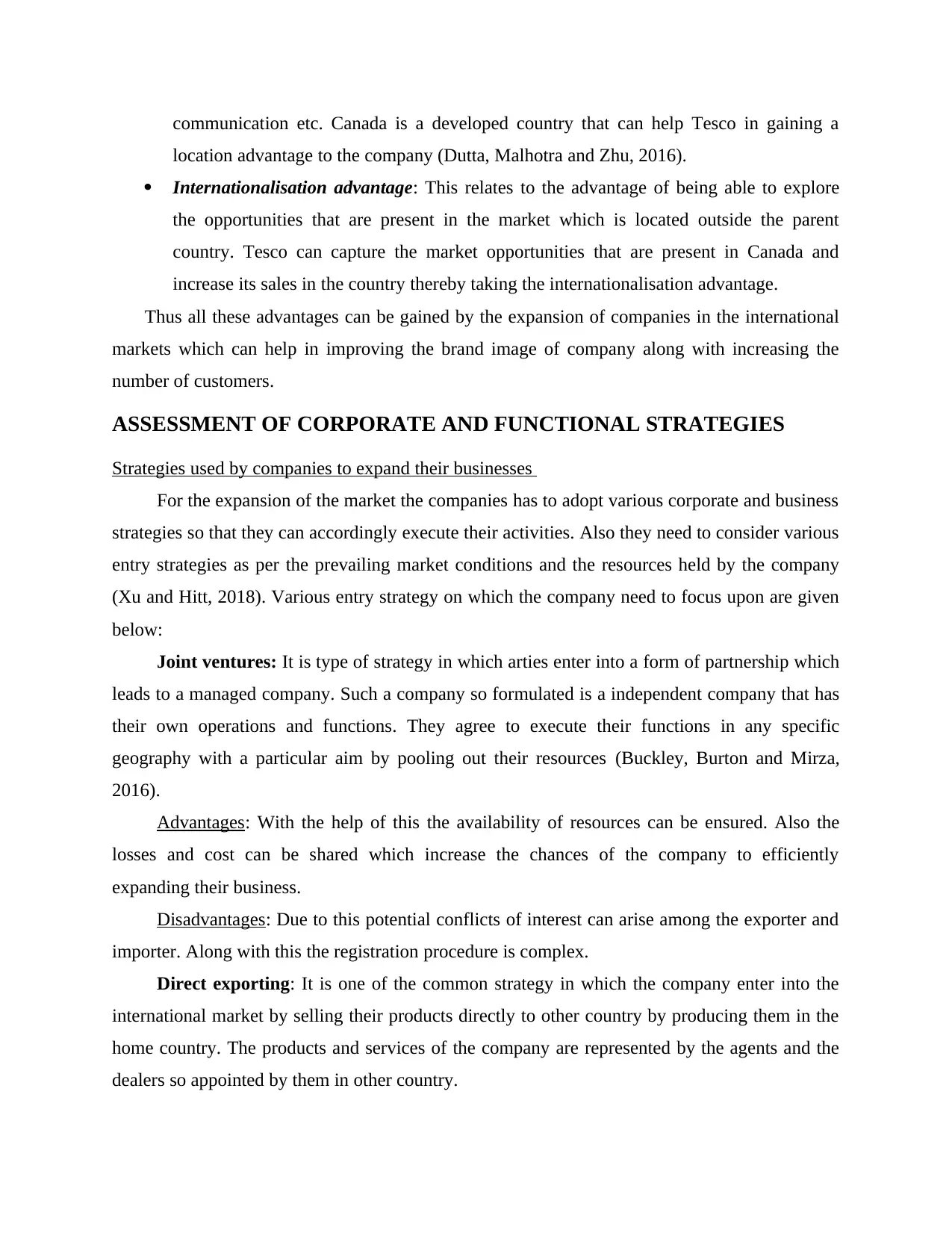
communication etc. Canada is a developed country that can help Tesco in gaining a
location advantage to the company (Dutta, Malhotra and Zhu, 2016).
Internationalisation advantage: This relates to the advantage of being able to explore
the opportunities that are present in the market which is located outside the parent
country. Tesco can capture the market opportunities that are present in Canada and
increase its sales in the country thereby taking the internationalisation advantage.
Thus all these advantages can be gained by the expansion of companies in the international
markets which can help in improving the brand image of company along with increasing the
number of customers.
ASSESSMENT OF CORPORATE AND FUNCTIONAL STRATEGIES
Strategies used by companies to expand their businesses
For the expansion of the market the companies has to adopt various corporate and business
strategies so that they can accordingly execute their activities. Also they need to consider various
entry strategies as per the prevailing market conditions and the resources held by the company
(Xu and Hitt, 2018). Various entry strategy on which the company need to focus upon are given
below:
Joint ventures: It is type of strategy in which arties enter into a form of partnership which
leads to a managed company. Such a company so formulated is a independent company that has
their own operations and functions. They agree to execute their functions in any specific
geography with a particular aim by pooling out their resources (Buckley, Burton and Mirza,
2016).
Advantages: With the help of this the availability of resources can be ensured. Also the
losses and cost can be shared which increase the chances of the company to efficiently
expanding their business.
Disadvantages: Due to this potential conflicts of interest can arise among the exporter and
importer. Along with this the registration procedure is complex.
Direct exporting: It is one of the common strategy in which the company enter into the
international market by selling their products directly to other country by producing them in the
home country. The products and services of the company are represented by the agents and the
dealers so appointed by them in other country.
location advantage to the company (Dutta, Malhotra and Zhu, 2016).
Internationalisation advantage: This relates to the advantage of being able to explore
the opportunities that are present in the market which is located outside the parent
country. Tesco can capture the market opportunities that are present in Canada and
increase its sales in the country thereby taking the internationalisation advantage.
Thus all these advantages can be gained by the expansion of companies in the international
markets which can help in improving the brand image of company along with increasing the
number of customers.
ASSESSMENT OF CORPORATE AND FUNCTIONAL STRATEGIES
Strategies used by companies to expand their businesses
For the expansion of the market the companies has to adopt various corporate and business
strategies so that they can accordingly execute their activities. Also they need to consider various
entry strategies as per the prevailing market conditions and the resources held by the company
(Xu and Hitt, 2018). Various entry strategy on which the company need to focus upon are given
below:
Joint ventures: It is type of strategy in which arties enter into a form of partnership which
leads to a managed company. Such a company so formulated is a independent company that has
their own operations and functions. They agree to execute their functions in any specific
geography with a particular aim by pooling out their resources (Buckley, Burton and Mirza,
2016).
Advantages: With the help of this the availability of resources can be ensured. Also the
losses and cost can be shared which increase the chances of the company to efficiently
expanding their business.
Disadvantages: Due to this potential conflicts of interest can arise among the exporter and
importer. Along with this the registration procedure is complex.
Direct exporting: It is one of the common strategy in which the company enter into the
international market by selling their products directly to other country by producing them in the
home country. The products and services of the company are represented by the agents and the
dealers so appointed by them in other country.
⊘ This is a preview!⊘
Do you want full access?
Subscribe today to unlock all pages.

Trusted by 1+ million students worldwide
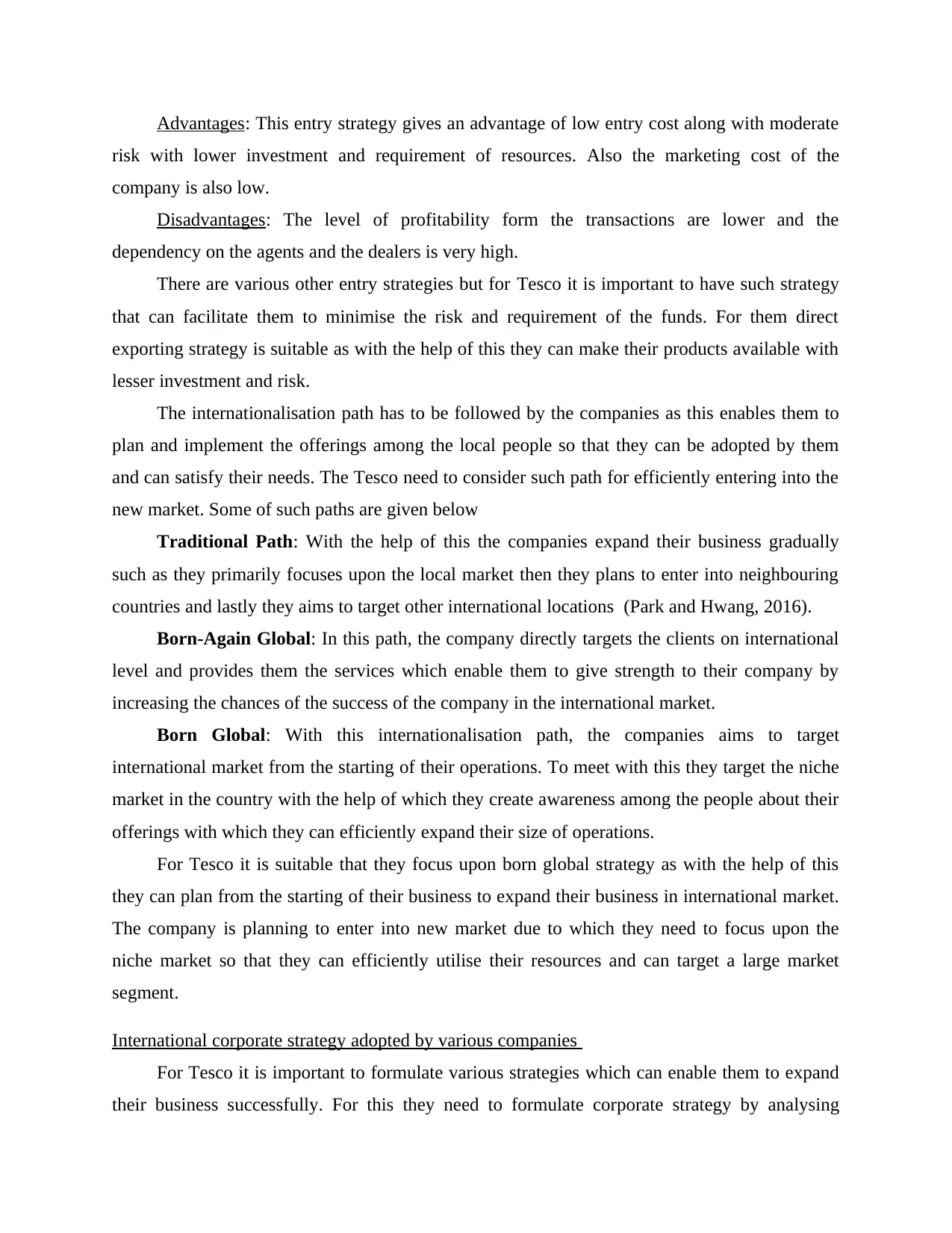
Advantages: This entry strategy gives an advantage of low entry cost along with moderate
risk with lower investment and requirement of resources. Also the marketing cost of the
company is also low.
Disadvantages: The level of profitability form the transactions are lower and the
dependency on the agents and the dealers is very high.
There are various other entry strategies but for Tesco it is important to have such strategy
that can facilitate them to minimise the risk and requirement of the funds. For them direct
exporting strategy is suitable as with the help of this they can make their products available with
lesser investment and risk.
The internationalisation path has to be followed by the companies as this enables them to
plan and implement the offerings among the local people so that they can be adopted by them
and can satisfy their needs. The Tesco need to consider such path for efficiently entering into the
new market. Some of such paths are given below
Traditional Path: With the help of this the companies expand their business gradually
such as they primarily focuses upon the local market then they plans to enter into neighbouring
countries and lastly they aims to target other international locations (Park and Hwang, 2016).
Born-Again Global: In this path, the company directly targets the clients on international
level and provides them the services which enable them to give strength to their company by
increasing the chances of the success of the company in the international market.
Born Global: With this internationalisation path, the companies aims to target
international market from the starting of their operations. To meet with this they target the niche
market in the country with the help of which they create awareness among the people about their
offerings with which they can efficiently expand their size of operations.
For Tesco it is suitable that they focus upon born global strategy as with the help of this
they can plan from the starting of their business to expand their business in international market.
The company is planning to enter into new market due to which they need to focus upon the
niche market so that they can efficiently utilise their resources and can target a large market
segment.
International corporate strategy adopted by various companies
For Tesco it is important to formulate various strategies which can enable them to expand
their business successfully. For this they need to formulate corporate strategy by analysing
risk with lower investment and requirement of resources. Also the marketing cost of the
company is also low.
Disadvantages: The level of profitability form the transactions are lower and the
dependency on the agents and the dealers is very high.
There are various other entry strategies but for Tesco it is important to have such strategy
that can facilitate them to minimise the risk and requirement of the funds. For them direct
exporting strategy is suitable as with the help of this they can make their products available with
lesser investment and risk.
The internationalisation path has to be followed by the companies as this enables them to
plan and implement the offerings among the local people so that they can be adopted by them
and can satisfy their needs. The Tesco need to consider such path for efficiently entering into the
new market. Some of such paths are given below
Traditional Path: With the help of this the companies expand their business gradually
such as they primarily focuses upon the local market then they plans to enter into neighbouring
countries and lastly they aims to target other international locations (Park and Hwang, 2016).
Born-Again Global: In this path, the company directly targets the clients on international
level and provides them the services which enable them to give strength to their company by
increasing the chances of the success of the company in the international market.
Born Global: With this internationalisation path, the companies aims to target
international market from the starting of their operations. To meet with this they target the niche
market in the country with the help of which they create awareness among the people about their
offerings with which they can efficiently expand their size of operations.
For Tesco it is suitable that they focus upon born global strategy as with the help of this
they can plan from the starting of their business to expand their business in international market.
The company is planning to enter into new market due to which they need to focus upon the
niche market so that they can efficiently utilise their resources and can target a large market
segment.
International corporate strategy adopted by various companies
For Tesco it is important to formulate various strategies which can enable them to expand
their business successfully. For this they need to formulate corporate strategy by analysing
Paraphrase This Document
Need a fresh take? Get an instant paraphrase of this document with our AI Paraphraser
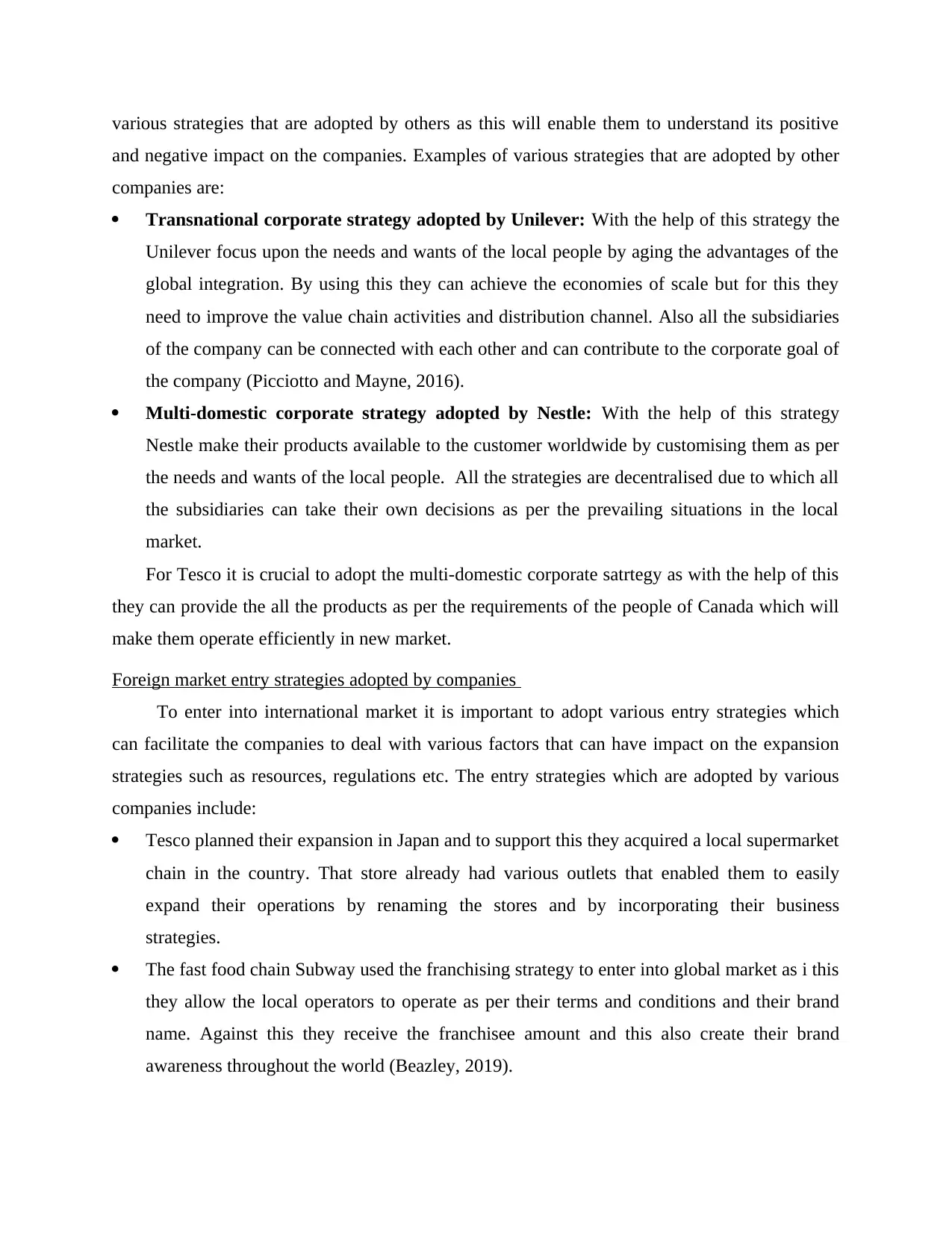
various strategies that are adopted by others as this will enable them to understand its positive
and negative impact on the companies. Examples of various strategies that are adopted by other
companies are:
Transnational corporate strategy adopted by Unilever: With the help of this strategy the
Unilever focus upon the needs and wants of the local people by aging the advantages of the
global integration. By using this they can achieve the economies of scale but for this they
need to improve the value chain activities and distribution channel. Also all the subsidiaries
of the company can be connected with each other and can contribute to the corporate goal of
the company (Picciotto and Mayne, 2016).
Multi-domestic corporate strategy adopted by Nestle: With the help of this strategy
Nestle make their products available to the customer worldwide by customising them as per
the needs and wants of the local people. All the strategies are decentralised due to which all
the subsidiaries can take their own decisions as per the prevailing situations in the local
market.
For Tesco it is crucial to adopt the multi-domestic corporate satrtegy as with the help of this
they can provide the all the products as per the requirements of the people of Canada which will
make them operate efficiently in new market.
Foreign market entry strategies adopted by companies
To enter into international market it is important to adopt various entry strategies which
can facilitate the companies to deal with various factors that can have impact on the expansion
strategies such as resources, regulations etc. The entry strategies which are adopted by various
companies include:
Tesco planned their expansion in Japan and to support this they acquired a local supermarket
chain in the country. That store already had various outlets that enabled them to easily
expand their operations by renaming the stores and by incorporating their business
strategies.
The fast food chain Subway used the franchising strategy to enter into global market as i this
they allow the local operators to operate as per their terms and conditions and their brand
name. Against this they receive the franchisee amount and this also create their brand
awareness throughout the world (Beazley, 2019).
and negative impact on the companies. Examples of various strategies that are adopted by other
companies are:
Transnational corporate strategy adopted by Unilever: With the help of this strategy the
Unilever focus upon the needs and wants of the local people by aging the advantages of the
global integration. By using this they can achieve the economies of scale but for this they
need to improve the value chain activities and distribution channel. Also all the subsidiaries
of the company can be connected with each other and can contribute to the corporate goal of
the company (Picciotto and Mayne, 2016).
Multi-domestic corporate strategy adopted by Nestle: With the help of this strategy
Nestle make their products available to the customer worldwide by customising them as per
the needs and wants of the local people. All the strategies are decentralised due to which all
the subsidiaries can take their own decisions as per the prevailing situations in the local
market.
For Tesco it is crucial to adopt the multi-domestic corporate satrtegy as with the help of this
they can provide the all the products as per the requirements of the people of Canada which will
make them operate efficiently in new market.
Foreign market entry strategies adopted by companies
To enter into international market it is important to adopt various entry strategies which
can facilitate the companies to deal with various factors that can have impact on the expansion
strategies such as resources, regulations etc. The entry strategies which are adopted by various
companies include:
Tesco planned their expansion in Japan and to support this they acquired a local supermarket
chain in the country. That store already had various outlets that enabled them to easily
expand their operations by renaming the stores and by incorporating their business
strategies.
The fast food chain Subway used the franchising strategy to enter into global market as i this
they allow the local operators to operate as per their terms and conditions and their brand
name. Against this they receive the franchisee amount and this also create their brand
awareness throughout the world (Beazley, 2019).
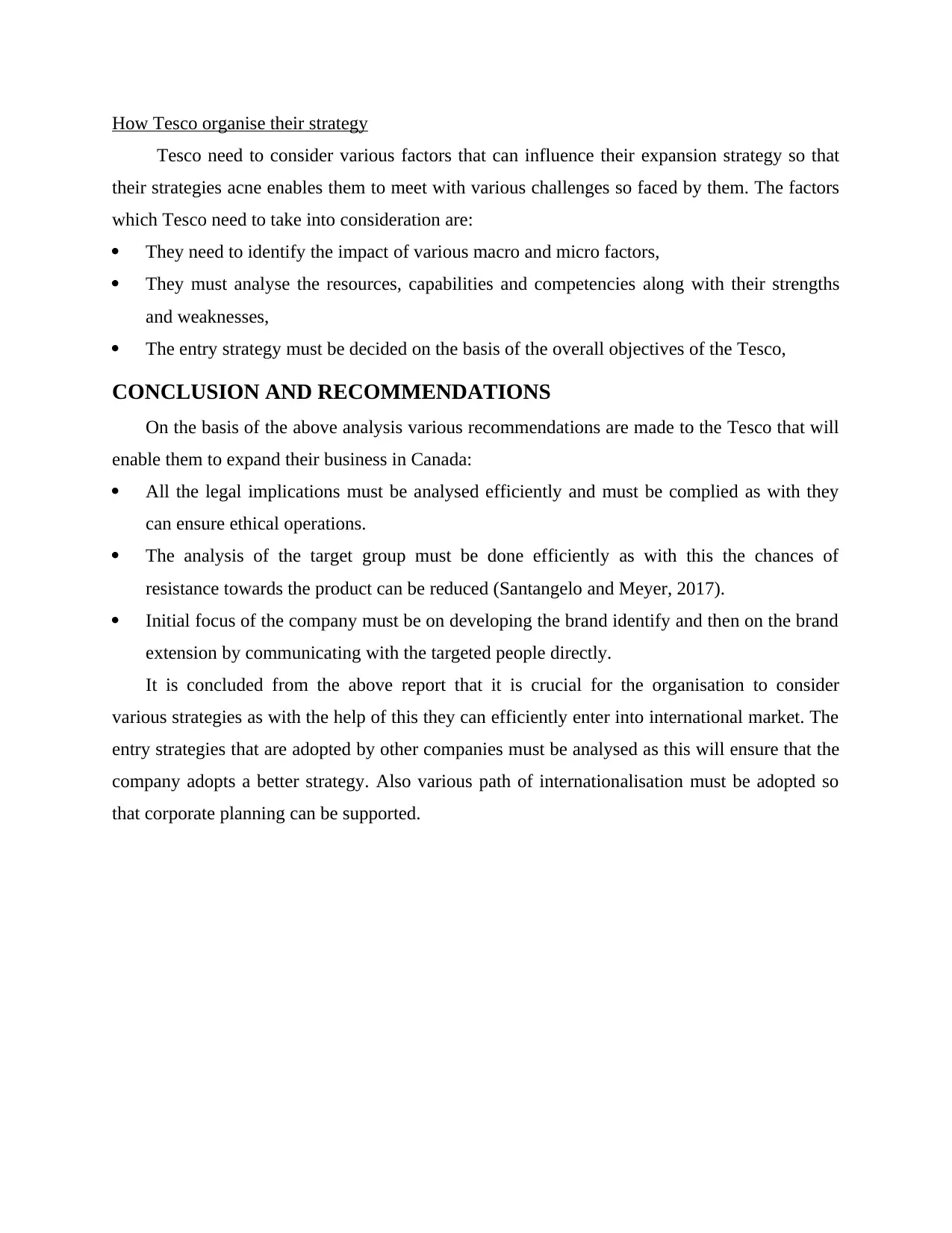
How Tesco organise their strategy
Tesco need to consider various factors that can influence their expansion strategy so that
their strategies acne enables them to meet with various challenges so faced by them. The factors
which Tesco need to take into consideration are:
They need to identify the impact of various macro and micro factors,
They must analyse the resources, capabilities and competencies along with their strengths
and weaknesses,
The entry strategy must be decided on the basis of the overall objectives of the Tesco,
CONCLUSION AND RECOMMENDATIONS
On the basis of the above analysis various recommendations are made to the Tesco that will
enable them to expand their business in Canada:
All the legal implications must be analysed efficiently and must be complied as with they
can ensure ethical operations.
The analysis of the target group must be done efficiently as with this the chances of
resistance towards the product can be reduced (Santangelo and Meyer, 2017).
Initial focus of the company must be on developing the brand identify and then on the brand
extension by communicating with the targeted people directly.
It is concluded from the above report that it is crucial for the organisation to consider
various strategies as with the help of this they can efficiently enter into international market. The
entry strategies that are adopted by other companies must be analysed as this will ensure that the
company adopts a better strategy. Also various path of internationalisation must be adopted so
that corporate planning can be supported.
Tesco need to consider various factors that can influence their expansion strategy so that
their strategies acne enables them to meet with various challenges so faced by them. The factors
which Tesco need to take into consideration are:
They need to identify the impact of various macro and micro factors,
They must analyse the resources, capabilities and competencies along with their strengths
and weaknesses,
The entry strategy must be decided on the basis of the overall objectives of the Tesco,
CONCLUSION AND RECOMMENDATIONS
On the basis of the above analysis various recommendations are made to the Tesco that will
enable them to expand their business in Canada:
All the legal implications must be analysed efficiently and must be complied as with they
can ensure ethical operations.
The analysis of the target group must be done efficiently as with this the chances of
resistance towards the product can be reduced (Santangelo and Meyer, 2017).
Initial focus of the company must be on developing the brand identify and then on the brand
extension by communicating with the targeted people directly.
It is concluded from the above report that it is crucial for the organisation to consider
various strategies as with the help of this they can efficiently enter into international market. The
entry strategies that are adopted by other companies must be analysed as this will ensure that the
company adopts a better strategy. Also various path of internationalisation must be adopted so
that corporate planning can be supported.
⊘ This is a preview!⊘
Do you want full access?
Subscribe today to unlock all pages.

Trusted by 1+ million students worldwide
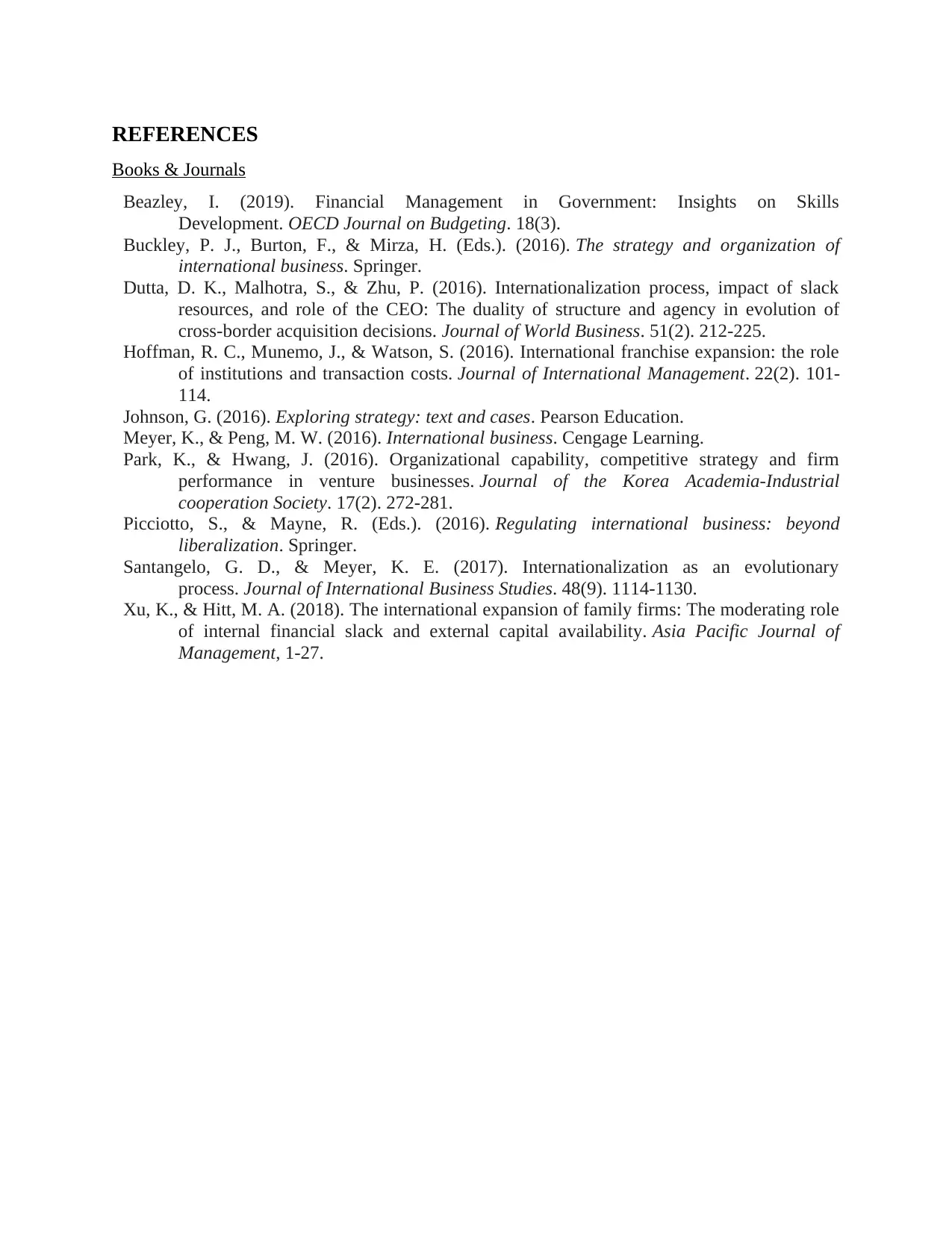
REFERENCES
Books & Journals
Beazley, I. (2019). Financial Management in Government: Insights on Skills
Development. OECD Journal on Budgeting. 18(3).
Buckley, P. J., Burton, F., & Mirza, H. (Eds.). (2016). The strategy and organization of
international business. Springer.
Dutta, D. K., Malhotra, S., & Zhu, P. (2016). Internationalization process, impact of slack
resources, and role of the CEO: The duality of structure and agency in evolution of
cross-border acquisition decisions. Journal of World Business. 51(2). 212-225.
Hoffman, R. C., Munemo, J., & Watson, S. (2016). International franchise expansion: the role
of institutions and transaction costs. Journal of International Management. 22(2). 101-
114.
Johnson, G. (2016). Exploring strategy: text and cases. Pearson Education.
Meyer, K., & Peng, M. W. (2016). International business. Cengage Learning.
Park, K., & Hwang, J. (2016). Organizational capability, competitive strategy and firm
performance in venture businesses. Journal of the Korea Academia-Industrial
cooperation Society. 17(2). 272-281.
Picciotto, S., & Mayne, R. (Eds.). (2016). Regulating international business: beyond
liberalization. Springer.
Santangelo, G. D., & Meyer, K. E. (2017). Internationalization as an evolutionary
process. Journal of International Business Studies. 48(9). 1114-1130.
Xu, K., & Hitt, M. A. (2018). The international expansion of family firms: The moderating role
of internal financial slack and external capital availability. Asia Pacific Journal of
Management, 1-27.
Books & Journals
Beazley, I. (2019). Financial Management in Government: Insights on Skills
Development. OECD Journal on Budgeting. 18(3).
Buckley, P. J., Burton, F., & Mirza, H. (Eds.). (2016). The strategy and organization of
international business. Springer.
Dutta, D. K., Malhotra, S., & Zhu, P. (2016). Internationalization process, impact of slack
resources, and role of the CEO: The duality of structure and agency in evolution of
cross-border acquisition decisions. Journal of World Business. 51(2). 212-225.
Hoffman, R. C., Munemo, J., & Watson, S. (2016). International franchise expansion: the role
of institutions and transaction costs. Journal of International Management. 22(2). 101-
114.
Johnson, G. (2016). Exploring strategy: text and cases. Pearson Education.
Meyer, K., & Peng, M. W. (2016). International business. Cengage Learning.
Park, K., & Hwang, J. (2016). Organizational capability, competitive strategy and firm
performance in venture businesses. Journal of the Korea Academia-Industrial
cooperation Society. 17(2). 272-281.
Picciotto, S., & Mayne, R. (Eds.). (2016). Regulating international business: beyond
liberalization. Springer.
Santangelo, G. D., & Meyer, K. E. (2017). Internationalization as an evolutionary
process. Journal of International Business Studies. 48(9). 1114-1130.
Xu, K., & Hitt, M. A. (2018). The international expansion of family firms: The moderating role
of internal financial slack and external capital availability. Asia Pacific Journal of
Management, 1-27.
1 out of 10
Related Documents
Your All-in-One AI-Powered Toolkit for Academic Success.
+13062052269
info@desklib.com
Available 24*7 on WhatsApp / Email
![[object Object]](/_next/static/media/star-bottom.7253800d.svg)
Unlock your academic potential
Copyright © 2020–2026 A2Z Services. All Rights Reserved. Developed and managed by ZUCOL.





